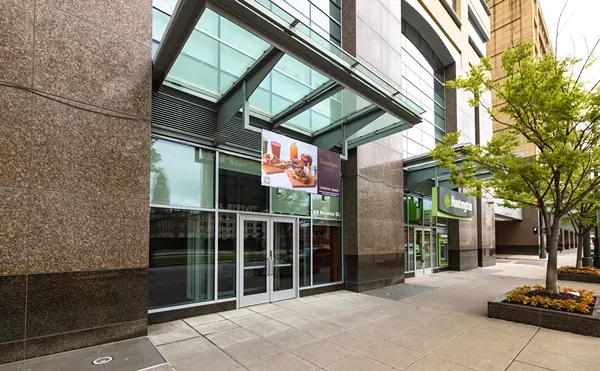Al-Ameer's Mediterranean mélange aims for freshness and flavor
The portions at this Middle-Eastern Dearborn eatery are no joke, either

Audio By Carbonatix
[
{
"name": "GPT - Leaderboard - Inline - Content",
"component": "35519556",
"insertPoint": "5th",
"startingPoint": "3",
"requiredCountToDisplay": "3",
"maxInsertions": 100,
"adList": [
{
"adPreset": "LeaderboardInline"
}
]
}
]
Al-Ameer
12710 W. Warren Ave.,
Dearborn
313-582-8185
Handicap accessible
Entrées: $8.95-$17.95,
most $10.95-$14.95
Al-Ameer has a second location at
27346 Ford Rd.,
Dearborn Heights,
313-565-9600.
Both restaurants are open
every day, 10 a.m. to 11 p.m.
As at many Middle Eastern restaurants, there are far too many choices at Al-Ameer for any but the most faithful visitor to do justice to. Besides 20 "main entrées," there are 20 "house favorites" and 15 "special house favorites," plus 12 vegetarian salads, eight vegetarian plates and 11 appetizers. Some of these, to be sure, are platters, trays or combos of other dishes, so the actual number of foods on offer is a bit less than 86, until you factor in the sandwiches, soups and juices, which push you way past 100.
Should one sample the tried-and-true dishes that most customers and most readers will order — shish kabob and shish tawook, kafta, shawarma, falafel and above all hommous — or look for the lesser known?
I mostly did the latter at Al-Ameer, though nothing I tried was rare or exotic. I came away satisfied and laden with polystyrene containers.
Because Al-Ameer portions are gargantuan. A group of four on a starving-artist budget could do quite well by sharing and splitting the cost of a $9.95 plate of moujadara and a small baked eggplant salad ($3.75). If they splurged and added a plate of stuffed lamb and rice, they'd go home stuffed too.
Service is swift, friendly and helpful. Questioned about the salads, a sweet waiter explained to me that tabbouleh is "mostly parsley." A big engraved-brass hanging of a Middle Eastern scene dominates one wall, and artifacts and paintings abound. The clientele is mixed; one evening a medical student who'd grown up a couple blocks away brought what looked like his whole Benetton-ad-esque U-M class, to show off his home cuisine.
Al-Ameer (it means "the prince") has its own meat market next door, which could be one reason the chef offers lots of lamb, even lamb liver, rather than cutting back to beef. Manager Abbas Amar says the goal is to keep the cuisine as authentic as possible, rather than Westernizing. Most meats are just salted and peppered rather than adding spices.
This was obvious in the stuffed lamb, which came deconstructed: lots of roasted and partly shredded lamb with pine nuts atop rice, imparting a good lamb flavor and nothing extra.
Lamb stew is similarly straightforward, if a bit greasy: lots of chewy strips sautéed with lots of peppers. I liked this one better the next day; there was plenty of all the dishes the next day, except for a whole Canadian whitefish. The critter was at least 18 finny inches long, fried within an inch of its life and appropriately crisp outside and flaky within.
A vegetarian friend raved about the moujadara (more often spelled mjadra), and she was right: The lentils and rice are fine, but what actually makes people love mjadra, the caramelized onions on top, are abundant and sweet. Again, no fancy spicing, and none needed.
Arayes is a favorite of mine, partly for the texture contrasts: thin, crisp toasted pita stuffed with ground lamb and onions. You'll get a plate of about 10 tender triangles.
Al-Ameer shines as brightly in its side dishes as in its mains. A cabbage salad is crunchy and very garlicky; an eggplant salad is soft and very garlicky, the eggplant baked to a pulp and then mixed with lemon juice and olive oil.
The two soups are standouts, both the humble but complex lentil, not puréed perfectly smooth, lovely with flecks of carrot against its soft gold, and a sizable every-vegetable chicken-vegetable soup, with chunks of chicken clearly cut by a generous hand, not a machine.
One of the tastiest dishes we tried was sujuk, an appetizer of one-inch chunks of slightly spicy sausage, cooked with tomatoes in a tart golden sauce that can be sopped up with pita. Pita rounds are small, puffed and baked on-site, improving the bread experience 500 percent.
Hummus has a faint vegetable flavor here, belying its legume origins: fine but forgettable. Nineteen raw juices and smoothies plus a "milk cocktail" provide plenty of opportunities to feel virtuous, even if you choose mango-banana-honey over carrot-beet-celery.
I loved avocado with honey, which tasted just like that (drink this one up, it deteriorates with the hours), and the Al-Ameer Specialty, more like a fruit salad than a drink. A big glass of mango juice is filled with many varieties of chunky fruit, then topped with pistachios, honey, a big chunk of ricotta (ashta) and some jewel-red strawberry syrup. The overall taste is strawberry but it's diverse enough to keep you guessing with each spoonful.
That's one good choice for dessert, but Al-Ameer has also recently begun baking French pastries, which are not on the menu, so ask.






